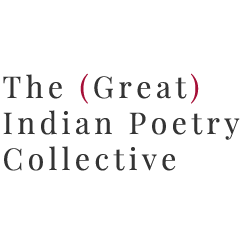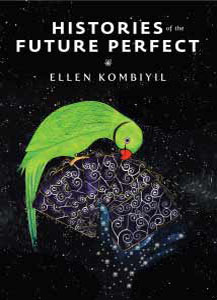FOR IMMEDIATE RELEASE
The (Great) Indian Poetry Collective To Publish Three Winners
Subhashini Kaligotla wins Emerging Poets Prize
(selected by Arundhathi Subramaniam)
Ranjani Murali & Akhil Katyal win Editor’s Choice Awards
BANGALORE — Out of a robust field of nearly 100 entries, three winning manuscripts have been chosen for publication by The (Great) Indian Poetry Collective, a publishing house founded in Bangalore, India. The winners are:
- Emerging Poets Prize (selected by Arundhathi Subramaniam): Subhashini Kaligotla
- Editor’s Choice Award (book): Ranjani Murali
- Editor’s Choice Award (chapbook): Akhil Katyal
The guest judge, acclaimed Indian poet Arundhathi Subramaniam, called Subhashini’s book “a finely poised work, dexterous and emotionally nuanced.”
The editors found Ranjani’s book to be a playful exploration of Indian linguistic rhythms, applying feminist and postcolonial ideas to navigate the complications of being an “Indian” voice, a “global” voice, and a female voice.
Akhil’s book will be the first chapbook published by the Collective. The editors saw in Akhil’s work a powerful activist-based voice that is taking on the important issues of the day.
Subhashini and Ranjani will receive prizes of Rs. 15,000. Akhil will receive a prize of Rs. 5,000 for the shorter-length manuscript.
All three books will be published in 2017.
Poets Shikha Malaviya, Ellen Kombiyil, and Minal Hajratwala founded The (Great) Indian Poetry Collective in 2013. In 2015, Rohan Chhetri, Vidhu Aggarwal and Jennifer Robertson joined the Collective. Under a peer mentorship model, the poets publish contemporary books of English language poetry from India and the Indian diaspora each year, discovering and bringing forth new voices that are innovative and diverse. Collective books have received widespread critical acclaim. The Collective also runs inPoetry: The (Great) Indian Poetry App, available for Android users.
Below: Author bios
Download poet photos: https://drive.google.com/open?id=0B67N5ig639lVYUo5dUxRaFlUdEE
Download book covers: https://drive.google.com/folderview?id=0B67N5ig639lVc0pIX0tja09OeEU&usp=sharing
Biographies of the poets
The winning poets are available for interviews. Please send all interview requests to indianpoetrycollective@gmail.com .
Subhashini Kaligotlais a poet and architectural historian of medieval India. Born in the port city Visakhapatnam, she grew up in Coastal Andhra, Kuwait, and the United States, where she trained in electrical engineering. She gave up a successful career in the telecomm industry to pursue first an MFA in Creative Writing and then a PhD in Art History, earning both degrees from Columbia University. Her poems have appeared in such journals as The Caravan, Drunken Boat, The Literary Review, New England Review, and Western Humanities Review, and in anthologies of poetry from India and the globally dispersed Indian diaspora, most notably 60 Indian Poets (Penguin India, 2008). As editor, she curated the poetry content of two US-distributed print journals—Columbia: A Journal of Literature & Art and Catamaran—featuring Asian American poets and South Asian poetry in English and in English translation. A Kundiman fellow, she won a 2006-7 Fulbright grant to India for literary translation and has held residencies at Hedgebrook and Sanskriti Kendra. At present, Subhashini calls Berlin home. She is a postdoctoral fellow of the Kunsthistorisches Institut in Florenz, and working on a book manuscript titled Argument and Ornament in the Architecture of Deccan India.
Ranjani Murali is a Chicago-based writer and artist. She received her MFA in Poetry from George Mason University. She teaches writing and literature at Harper College in Illinois. She is the recipient of fellowships from the Vermont Studio Center and the Fine Arts Work Center. Her concrete poems and collaborative projects were showcased as part of the Fall for the Book Festival at GMU in 2009 and 2010. Ranjani won the Srinivas Rayaprol poetry prize in 2014 and the inaugural Almost Island manuscript prize in 2015. Her first book of poems is forthcoming next year.
Akhil Katyal is a writer and translator based in New Delhi. His first book of poems Night Charge Extra was shortlisted for the National Muse-India Satish Verma Young Writer Award (2015). He has been appointed as the Fellow for the 2016 International Writing Program Fall Residency at the University of Iowa. In 2014, he was selected as one of the five best emerging writers in India by The Caravan Magazine and the Columbia University Global Centre in France. His poems and translations between Hindi, English and Punjabi, including the works of Mangalesh Dabral, Uday Prakash, Amrita Pritam, Langston Hughes, Jackie Kay, Agha Shahid Ali and Dorothy Parker, have been widely published, including in The Four Quarters Magazine, Guftugu: Journal of the Indian Writers Forum, Indian Literature, The Bangalore Review, Earthen Lamp Journal, The Indian Express, Dawn, The Missing Slate and UCity Review. He teaches literature and creative writing at Shiv Nadar University.
About the Collective
The (Great) Indian Poetry Collective is the coming together of poets who believe words can transform lives. Founded in 2013, in Bangalore, India, as a not-for-profit poetry collective, The (Great) Indian Poetry Collective publishes innovative, diverse poetic voices from India. Through a mentorship model, members of the collective support one another in producing beautiful poetry books, chapbooks, and anthologies. Through workshops, readings, and community and school events, the Collective is building a poetry community in which artistic expression leads to positive action, as each poem initiates a dialogue with society and the greater world.
Poet Advisors
Meena Alexander
Sampurna Chattarjee
Eunice de Souza
Carolyn Forché
Ranjit Hoskote
Ravi Shankar
Prageeta Sharma
Arundhathi Subramaniam
Books from The (Great) Indian Poetry Collective
Geography of Tongues by Shikha Malaviya
Bountiful Instructions for Enlightenment by Minal Hajratwala
Histories of the Future Perfect by Ellen Kombiyil
The Trouble With Humpadori by Vidhu Aggarwal
Slow Startle by Rohan Chhetri
Q&A About the Emerging Poets Prize
Q: Describe what The (Great) Indian Poetry Collective publishes in 25 characters or less.
A: Poetry that matters/poetry that sings & singes.
Q: Who are your favorite writers?
A: We, at the collective, admire a diverse range of poets. Among them: Arun Kolatkar, Manohar Shetty, Vijay Seshadri, Jeet Thayil, Eavan Boland, Li-Young Lee, Gwendolyn Brooks, Theresa Cha, Claudia Rankine, Tracy K. Smith, Srikanth Reddy, Bernadette Mayer, Mei-mei Berssenbrugge, Bhanu Kapil, and of course our esteemed advisors: Ranjit Hoskote, Eunice deSouza, Arundhathi Subramaniam, Ravi Shankar, Sudeep Sen, Prageeta Sharma, Carolyn Forche, Sampurna Chattarji, Jerry Pinto & Meena Alexander.
Q: What sets your publishing house apart from others that publish similar material?
A: Our mentorship model ensures that poets get the resources and time they need to hone a manuscript into its final, shimmering form. Our aim is to grow the Indian poetry community outward. Skills gained in one year of being mentored through the whole publication process — editing, reworking poems or sections, structuring a manuscript, working with a designer, organizing book events — are paid forward in the second year, as each poet mentors the next batch of new collective members.
Q: Describe the ideal submission.
A: It begins with a poem that amazes and delights, that is a clarion call for the book itself. The poet is not afraid to take risks. While exploring this new terrain of the book, the poet leads us to vistas we otherwise would not have known.
Q: How much did you want to know about the person submitting to you?
A: A lot! When we publish new work, we’re inviting poets to join the Collective and make a commitment to work with us for at least two years. Working on books intensively together is a very intimate process, so we asked all of the poets to submit a Statement of Purpose. It was great to see them share a genuine sense of why you want to join and what kind of energy, ideas, and diversity they’d bring to the Collective. We are happy to have found not only great poets, but also collaborators who are excited about co-creating books and building a poetry community together.
Q: How were the winners chosen?
A: When a manuscript comes in, it is stripped of identifying details and then read ‘blind’ by one or more collective members. So in the first round, we’re looking strictly at the quality of the poetry: whether it moves, excites, thrills us.
The most promising manuscripts are then re-matched with their details and Statement of Purpose. In this second round, we’re looking at the whole package: the poetry, the poet, and our best sense of how it will be to work with this person.
Of those, the finalists are forwarded to our guest judge, who selects the Emerging Poets Prize winners. In addition, we select the Editor’s Choice awards. Winners receive a cash award, as well as publication of their books and a two-year membership to the collective.
Q. What advice would you give to aspiring poets?
A: Pay profound attention to the details of the language: sound, rhythm, melody, meaning. Every good poem is ultimately about language itself, too. Don’t use fancy words just to be fancy. Read excellent poetry; read, read, read. If you haven’t found any poetry you like, keep looking until you do. Learn how to revise — sometimes for years — until your poem is the best version of itself that it can possibly become. Kill clichés; they will ruin everything.
For more information, please contact indianpoetrycollective@gmail.com















